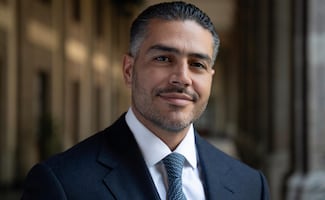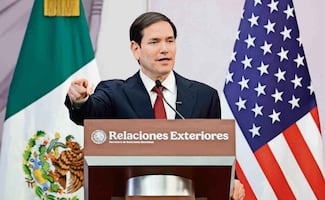Más Información

New York Times destaca rol de Harfuch en el combate del narco; resalta intercambio de inteligencia con EU

Marco Rubio destaca labor de seguridad de México; "están haciendo más que nunca en su historia", afirma

"Queremos cerrar este capítulo", dice Salinas Pliego al SAT; esperarán a enero a conocer fundamentos legales de adeudo fiscal
With security details, communication protocols, or a police escort at rallies and transfers, that is how at least 214 candidates running for public offices move across the towns and communities of their municipalities one weak ahead of election day.
These candidates are spread across 16 states and, although the list includes states from the north and center of the country, it's mainly in the states of the Pacific coast where campaigning has become a life-threatening situation, given that it's in six states in this area, that 30 of the 47 cases of murdered candidates have taken place.
In these six states, there are at least 54 candidates under police protection.
State security
According to a recount made by EL UNIVERSAL, until June 23, 2018, there were 215 candidates who had received personal protection assigned by state governments through state law enforcement agencies and the corresponding prosecutor's offices. This number is separate from the 12 candidates looked after the Federal Police and the other 39 applications still being analyzed, according to the National Security Commissioner of the Ministry of the Interior, Renato Sales.
Although Guerrero still leads the body count with 14 candidates murdered , it also used to be the state with more candidates under protection until Puebla Minister of the Interior, Diodoro Carrasco, informed they are currently providing security to 50 candidates.
Guerrero now ranks second, with 40 candidates under police protection – according to the Governor of the state, Héctor Astudillo – and is followed by San Luis Potosí , where only one candidate has been murdered but 30 were assigned police protection.
This police protection ranges from a permanent security detail to security at public events, depending on the level of risk each candidate's faces.
A particular case is the one of northern-state of Coahuila , where 15 candidates currently receive police protection after the murder of Fernando Purón on June 8th, – the only candidate running for a federal office (deputy) to have been killed.
| States | No. of candidates under police protection |
| Puebla | 50 |
| Guerrero | 40 |
| San Luis Potosí | 30 |
| Coahuila | 15 |
| Guanajuato & Oaxaca | 10 |
| Nuevo León & State of Mexico | 9 |
| Tamaulipas & Michoacán | 6 |
| Chihuahua, Veracruz, & Tabasco | 5 |
| Hidalgo | 4 |
| Zacatecas | 3 |
As this edition went to press, in other states, there are 19 protection requests pending approval, including that of journalist Lili Téllez in Sonora, who is running for the Senate.
Candidates for Mayor's offices, the most vulnerable
In less than 24 hours between June 20 and 21 in Michoacán , two candidates running for Mayor of their cities were murdered: Omar Gómez – independent candidate in the municipality of Aguililla – and Fernando Ángeles – running for the PRD in Ocampo.
If we consider that 27 out of the 47 murdered candidates were running for a Mayor's office, then it's logic to think those who are running for these offices are the most vulnerable of all.
“A matter of timing”
For Ruben Salazar, director of consulting company Etellekt, specializing in political risks, the violence, mainly aimed at those running for a Mayor's office, is a matter of poor timing.
“In this election almost all Mayor's Offices will change administration and if we also consider the public offices at town halls, then we have an election in which over 18, 000 public offices will be defined at the same time in problematic states such as Michoacán, Guerrero, Oaxaca, and Puebla, ” he explains. For Salazar, the complexity of these states is seen in the reasons behind the murders of the candidates, which go from family and political disputes to organized crime.
Salazar explains authorities and institutions have decreased their power in the states of the Pacific coast, mainly due to the expansion of the Jalisco New Generation Cartel and the law enforcement operations against this group, which have sparked a violent counter-attack against public officials and authorities. All this, in addition to the increase in cocaine demand and supply.
“Ultimately, these groups were seeking to have an influence and control over authorities, which they need to control their territories and routes.”
For Salazar, this situation won't end on July 1st.
“This violence will continue and will escalate , not only against elected candidates but against their officials because these groups will always need to have an influence in the government structures. And if they fail to reach agreements with Mayors, they strike deals with lesser bureaucrats such as secretaries, directors, and the police forces.”
*With information by correspondents for EL UNIVERSAL
am
Noticias según tus intereses
[Publicidad]
[Publicidad]












